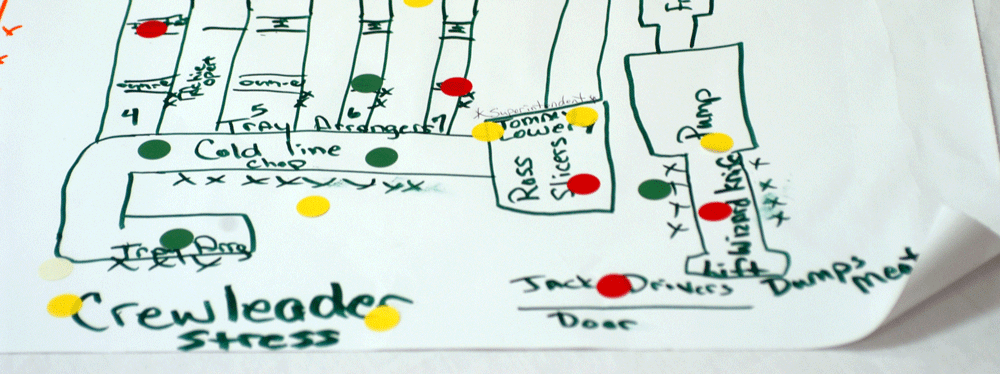Stewards Training Workshops and Handouts
- Complete Steward Training Outlines – English with Spanish
- Steward Training Outlines Intro
- Steward Training Outlines Roles
- Steward Training Outlines – UFCW and the Labor Movement
- Steward Training Outlines – Taking History to Heart
- Steward Training Outlines – Understanding Our Contract
- Steward Training Outlines – Organizing Around Workplace Issues
- Steward Training Outlines – Grievances
- Steward Training Outlines – Legal Rights of Union Stewards
- Steward Training Outlines – Union Power
- Steward Training Outlines – Organize
Local union member activism goes hand-in-hand with a strong steward structure.
Steward Training Outlines Intro
Steward Training Outlines – Grievances
Steward Training Outlines – Legal Rights of Union Stewards
Steward Training Outlines – Organize
Steward Training Outlines – Organizing Around Workplace Issues
Steward Training Outlines – Taking History to Heart
Steward Training Outlines – Taking History to Heart
Steward Training Outlines – UFCW and the Labor Movement
Steward Training Outlines – UFCW and the Labor Movement
Steward Training Outlines – Understanding Our Contract
Steward Training Outlines – Understanding Our Contract
Steward Training Outlines – Union Power
Steward Training Outlines – Union Power
Steward Training Outlines Roles
Steward Training
Steward trainings may happen as large, local-wide events and as smaller sessions organized by geography or worksites.
Some tips for steward training which builds ongoing member activism:
- Ask more experienced stewards what they would like to learn/ discuss
- Ask more experienced stewards to help lead trainings with less experienced stewards
- Bring stewards from different workplaces together to exchange ideas
- When discussing problem-solving strategies, introduce a variety of approaches, including work site organizing
- Use real situations for scenarios
- Build-in time for the stewards to practice hard conversations and other challenging moments
- Encourage critical thinking; pose situations where the stewards can debate different approaches
- Focus on specific steward skills and big-picture discussions so that stewards understand how their efforts are part of a larger movement for economic and social justice
Stewards’ Roles: A Comprehensive View
While stewards are most likely to be associated with grievances and related representational duties, it’s critical to communicate the many ways they contribute to our union’s efforts.
Organizers
Stewards’ most important job is to build an active, united membership at the workplace. Their ability to defend and improve conditions will always depend on the collective power of our membership. Specifically, stewards can:
- Welcome new employees and let them know how they can become involved.
- Ask non-members to join our union if in a so-called “right-to-work” state.
- Help with new organizing campaigns
- Find ways to involve more members in the activities of our union such as solving workplace problems, supporting negotiations, or participating in political action.
Communicators and Educators
The most effective forms of communication are one-on-one workplace conversations. Flyers, newsletters, emails, and meetings are all important, but the best way to inform members, get feedback, and encourage participation is through personal contact. Stewards can:
- Listen and learn about workers’ problems and concerns.
- Teach workers about our union, their rights under our contract, bargaining goals, important issues affecting working people and political efforts.
- Invite and challenge members to help win improvements—with specific requests.
- Unite and inspire co-workers to collaborate.
- Stay informed and be a link between workers, stewards, officers and staff.
- Educate by example through participation in union campaigns and other activities.

Local union member activism goes hand-in-hand with a strong steward structure.
Problem-Solvers
Stewards can be prepared with various strategies for solving problems. Some problems only affect one person, others affect a group. Different issues may require one or more of the following:
- Mobilizing workers to solve problems as a group. When issues affect large numbers of workers and provoke strong worker reactions, they may be best handled through a group action such as a petition, a “march on the boss,” or a button day.
- Holding informal discussions with management, the steward, and affected workers.
- Using the grievance procedure to address violations of the contract, company rules/policies or past practices.
While union staff are often able to individually address issues, the process of involving members in solving problems at their own workplace builds members’ sense that they are indeed “the union” and strengthens their capacity to take on future issues.
Leaders
Actions speak louder than words—a steward sets the example as a unifying advocate for workers’ rights. Stewards can also:
- Build unity: find common ground on problems that threaten to divide co-workers.
- Be an active participant in union decisions and actions: contract campaigns, conventions, political action, and organizing efforts…and always bring co-workers.
- Involve members when advocating on their behalf.
- Make sure everyone is involved in our union. Be aware of groups of members who – perhaps by shift, gender, race, job title, language, etc. – are not involved, and find ways to break down these barriers.
- Identify and recruit other leaders.
UFCW Stewards News from UFCW.org
[RSS]
